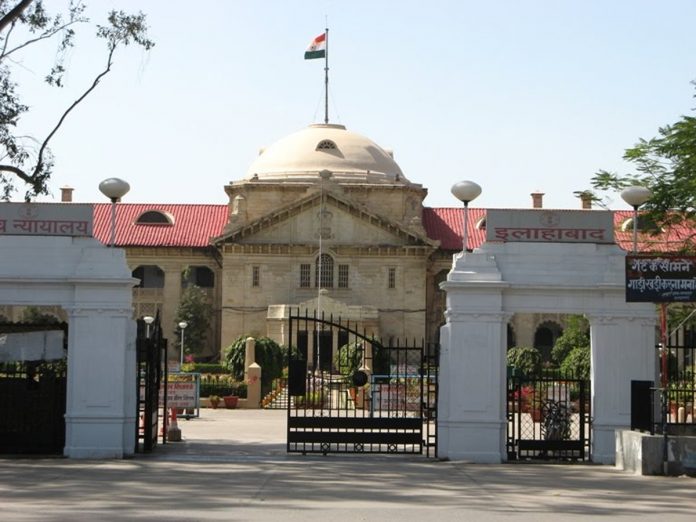The Allahabad High Court on Friday allowed an appeal thereby setting aside the order of Income Tax Appellate Tribunal, Allahabad whereby the appellant was held liable under section 68 of Income Tax Act 1961, for cash credit entries in the names of partners of his firm.
The appeal was filed under section 260A of the Income Tax Act, 1961 and was admitted on following questions of law:-
- Whether, on the facts and in the circumstances of the case, the Tribunal was legally justified in upholding the order of the assessing officer of making addition U/s 68 of the Income Tax Act at Rs.4,00,000/ in the hand of the firm?
- Whether, on the facts and in the circumstances of the case, the Tribunal was correct in holding that the assessee was not able to prove the source of income of partners who have made the deposit with the firm in their capital account therefore addition u/s 68 is justified?
Brief facts of the case are that the assessee has described itself as a partnership firm having sixteen partners engaged in the business of cold storage. For the assessment year 19992000, the assessee filed a return of income on 01.11.1999 declaring an income of Rs.36,92,056/. The case was selected for scrutiny and notices under Section 143(2)/142(1) of the Act were issued. The assessment was thereafter made under Section 143(3). The Assessing Officer held the credits as unproved and made an addition of Rs.4,00,000/ under Section 68 of the Act.
Thereafter, an appeal was filed by the assessee against the aforesaid order of Assessing officer before the Commissionerof Income Tax (Appeals), Allahabad, which was partly allowed and the addition made by the Assessing Officer under Section 68 of the Act with regard to the cash creditsin the names of the partners in their capital accounts was deleted. The Commissioner of Income Tax held that the partners had shown agricultural income in their returns. It was taken note of that the partners were identifiable and separately assessed to tax and the firm hadexplained the source of investment as agricultural income ofthe partners, therefore, if at all additions were to be made,then the same had tobe made in the hands of the partnersand not in the hands of the firm.
Aggrieved against the aforesaid order, the Revenue filed an appeal before the Income Tax Appellate Tribunal, Allahabad which was partly allowed and held that credits in the names of partners as agricultural income were not proved within the meaning of Section 68 and therefore the order of the Assessing Officer treating the same to be as the firm’s deemed income, was restored.
Appellant’s Counsel said that the partners have shown the agricultural income in their personal returns of the previous years, which was also accepted by the Revenue as such without any addition, and out of the said agricultural income the partners having made the deposits with the firm in their capital accounts, the appellant assessee had satisfied the conditions provided under Section 68 of the Act with regard to the identity and capacity of the depositors as well as genuineness of the transactions. The only point which was required to be considered on the question of making addition under Section 68 of the Act in the hands of the firm was the nature and source of the transaction and the appellant assessee was not required to prove the source of the source.
Respondent’s Counsel supported the order passed by the Tribunal and said that the credits having been found in the hands of the firm, the onus was on the firm to prove the credit worthiness of the partners as well as genuineness of the transaction and no evidence having been given with regard to agricultural operations of the partners, the transactions in the books of the firm were rightly held to be not genuine and proved within the meaning of Section 68.
The appeal was heard by the division bench comprising of Justice Biswanath Somadder & Justice Y.K. Srivastava who observed that, Section 68 of the Income Tax Act, 1961 requires the Assessing Officer to satisfy itself of the source of the credit and if during the course of enquiry undertaken, the entries are found to be not genuine then the sum represented by such credit entry is to be added as income of the assessee. The satisfaction of the Assessing Officer thus forms the basis for invocation of the provisions of Section 68 and in this regard, however, it must not be illusory or imaginary but is required to be based on the facts and the evidence and on the basis of a proper enquiry of the material before the Assessing Officer. The enquiry envisaged under the provision is to be reasonable and just.
The Court further observed that where a sum iscredited in the books of account of a firm from a partner, the assessee firm could discharge its onus by proving three things:
- Identity of the creditor;
- Creditworthiness of the creditor; and
- Genuineness of transaction inquestion.
Once the assessee proves all the three things its onus is discharged.
“It has also been consistently held that the assessee only needs to prove the source of credit entriesand he is not required to prove the source of the source orthe creditors’ credit”, said the High Court.
The High Court while allowing the appeal and setting aside the order of Income Tax Tribunal, that the partners have shown the agricultural income in their personal returns of the past years which had been accepted by the department as such the burden of proving the source of the credits having been sufficiently explained and the addition made by the assessing officer could not have been made in the hands of the firm.
Thus, the High Court allowed the appeal and answered the questions of law in favour of the assessee and against the Revenue.
-India Legal Bureau


